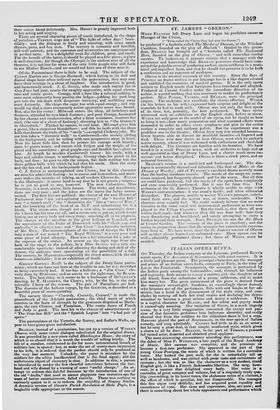ST. JAMES'S " OBERON."
WHEN ELLTSTON left Drury Lane and began his profitless career as Manager of the Circus,
C"Twas called the Circus then, but now the Surrey.")
he produced " a burletta called The Murder if Duncan, or the Witches' Cauldron, founded on the play of Macbeth." Guided by this prece- dent, BRAHAM has brought out a " burletta called The Enchanted Horn, founded on the play of Oberon ; " and with somewhat similar success. To lookers-on it appears strange that a manager with the experience and knowledge that BRAHMA possesses should have com- mit ted the palpable error of producing such an opera as Oberon in a muti- lated and imperfect form, and that he should not perceive it to be both a confession and an exposure of weakness. Oberon is the musical reproach of this country. Since the days of PURCELL no drama written in our language has in a like degree created and exhibited the resources of musical genius. It is the only opera written to English words that foreigners have translated and adopted. Produced at Covent Garden under the immediate direction of its author, it wanted nothing that was necessary to render its performance perfect. Miss PATON, VESTRIS, and BRAHAM, were the principal singers. The orchestra was excellent, the chorus effective. Weans (in his letters to his wife) expressed both surprise and delight at the materials he had to work with. Oberon was not only the best opera of its time, but, probably, the best performed. We have never witnessed such an exhibition on the English stage, before or since. WEBER not only gave us the model of an opera, but he taught us how to bring it out—how much preparation and what repeated efforts were demanded in order to efface every roughness and give to the entire surface a complete and uniform polish. But the experiment was a profitless one to the theatre : Oberon drew very few crowded houses fewer hearers able to discern its manifold beauties.—it lingered and died. Those who now desire to hear Oberon, must visit its author's native country, where it was welcomed with enthusiasm and cherished with delight. The Germans are familiar with its beauties. We have heard it in a small Prussian town, with an orchestra as large and as well appointed as that of Drury Lane, and a chorus much more nu- merous and better disciplined. Oberon is there a stock piece, and an universal favourite.
BRAHAM'S version is a mutilated and burlesqued one. The dia- logue is occasionally rhymed and ridiculous, like that of Midas or the Dragon of Wantley ; and of PLANCHE.'S excellent drama scarcely more than the leading incidents remain. The words of the songs are some- times retained, but frequently altered, and for the worse. But all this we could have pardoned, bad the music of the opera been completely and even respectably performed. But it was far from this. The orchestra of the St. James's Theatre is wholly unable to cope with. WEBER'S instrumentation : it was usuary feeble, and when otherwise discordant. The players, unable to master WEBEa's passages, substi- tuted their own ; and the uproar was, at times, intolerable. The choruses were equally bail. We could scarcely believe that we were listening to the same vocal and instrumental performers as were em- ployed in the Village Coquettes. But the truth is, that there all was within their reach, and whatever they did was done 'ehl: here they were floundering and bewildered, and vainly attempting to carry a burden beyond their strength. Even BRAHAM was not the Sir Hum of Covent Garden. The scenery of the piece is excellent ; and the outlay in preparation shows that the manager has considerable expecte- tions from it. We have none, since the St. James's version of Oberors will neither please learned nor unlearned ears. Many operas can be well—admirably performed there ; but those of WEBER Mist be avoided.






















 Previous page
Previous page